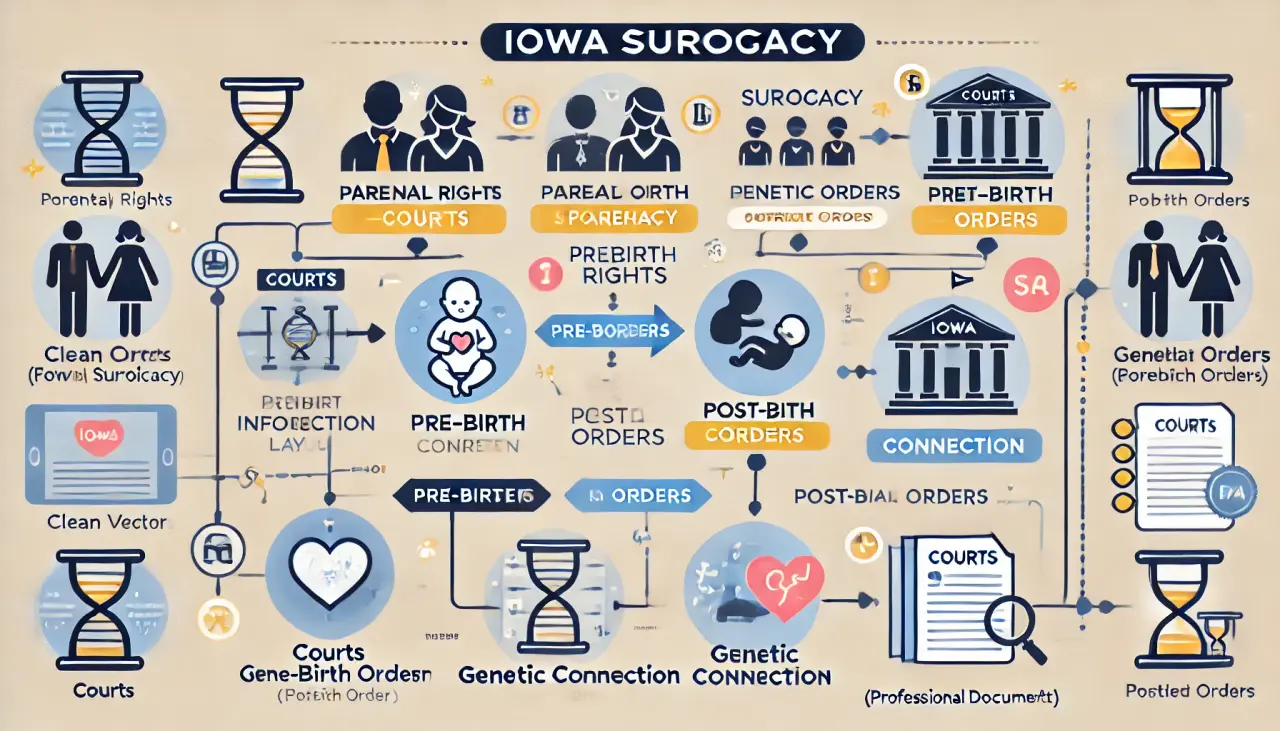
Surrogacy in Iowa: Laws for LGBTQ Couples, Parentage Orders, and IVF Processes
Surrogacy in Iowa is governed by Iowa Code Section 710.11 and 641-99.15, allowing both traditional and gestational surrogacy. Iowa’s laws generally support surrogacy arrangements, and recent legal trends continue to favor surrogacy contracts. While this article outlines general guidelines for surrogacy in Iowa, always consult with an experienced attorney who specializes in reproductive law to guide you through the process.

1. Surrogacy Laws in Iowa
1.1 Is Gestational Surrogacy Legal in Iowa?
Yes, it is legal. Iowa law permits gestational surrogacy, which involves a surrogate carrying a child created through IVF using the eggs and sperm of the intended parents or donors. The Iowa Department of Public Health is responsible for issuing birth certificates for children born via surrogacy. The state’s case law supports the enforceability of surrogacy contracts, ensuring that intended parents can establish legal rights over their child through pre-birth or post-birth orders.
1.2 Is Traditional Surrogacy Legal in Iowa?
Yes, it is legal. While traditional surrogacy is not prohibited by Iowa law, it is rare. In traditional surrogacy, the surrogate is the biological mother of the child, which may complicate parental rights. Iowa courts tend to favor the biological mother, which can make traditional surrogacy more legally complex. As a result, most surrogacy contracts in Iowa involve gestational surrogacy, where the surrogate has no genetic link to the child.
1.3 Is Paid Commercial Surrogacy Legal in Iowa?
Yes, it is legal. Iowa does not impose limits on the compensation that surrogates can receive, which is determined by the surrogacy contract between the surrogate and the intended parents. Besides the base compensation, surrogates may be reimbursed for medical, legal, and psychological expenses, as well as additional costs such as maternity clothing, travel, and lost wages. These provisions ensure that surrogates are adequately supported throughout the process.

2. Surrogacy Contracts in Iowa
Iowa law does not require any specific clauses in surrogacy contracts. However, it is crucial that both the surrogate and the intended parents work with separate legal counsel to protect their individual rights. These attorneys will help draft a contract that covers:
- Compensation and payment methods for the surrogate
- Health risks and responsibilities during the surrogacy process
- Legal procedures for establishing parental rights
- Communication expectations during and after the pregnancy
- Hospitalization and delivery plans
- Any other relevant provisions that safeguard the interests of both parties
Before IVF procedures can begin, both the surrogate and the intended parents, along with their spouses (if applicable), must sign the surrogacy contract.

3. Determining Parental Rights in Iowa Surrogacy
Iowa offers both Pre-birth Orders and Post-birth Orders to establish parental rights in surrogacy cases. However, these orders are subject to specific guidelines:
- Pre-birth Orders can be granted only to the intended father if there is a genetic connection to the child. Iowa law considers the surrogate as the legal mother of the child regardless of her genetic link.
- For intended parents who do not have a genetic relationship to the child, a post-birth adoption process is required to establish legal parentage.
Post-birth orders are generally granted to the intended mother if she has a genetic connection to the child.

4. Surrogacy for LGBTQ Couples in Iowa
Is Surrogacy Legal for LGBTQ Couples in Iowa?
Yes, it is legal. Surrogacy in Iowa is open to all couples, including LGBTQ families. Whether you are a gay, lesbian, or bisexual couple, the legal rights for surrogacy are the same as for heterosexual couples. LGBTQ parents may need to use an egg or sperm donor to complete the IVF process, but they are entitled to the same surrogacy opportunities as anyone else.
Are There Any Other Laws Affecting LGBTQ Parenting in Iowa?
No, there are no specific laws. Iowa does not have any laws that specifically target LGBTQ parents, so they enjoy the same rights and protections as heterosexual couples. This includes access to surrogacy and fertility treatments through IVF and surrogacy.
5. Common Questions About Surrogacy in Iowa
Are Surrogacy Contracts Enforceable in Iowa?
Yes, surrogacy contracts in Iowa are enforceable under Iowa case law and statutory law, although the state does not have a law explicitly confirming the enforceability of these contracts. Surrogacy contracts are treated like any other legal agreement, provided they are entered into with proper legal representation.
Are There Special Laws for Foreign Intended Parents Completing Surrogacy in Iowa?
No, the laws are the same. Whether domestic or international, surrogacy laws in Iowa apply equally. However, international intended parents should consult an immigration attorney to ensure they comply with the necessary steps for bringing their child back to their home country after birth.
When Do Intended Parents Need to Complete Adoption After Birth?
If the intended parents do not have a genetic connection to the child, they must complete an adoption process after the child’s birth to establish parental rights. However, if the intended mother is genetically connected to the child, she may apply for a Post-birth Parentage Order to establish her legal rights.
Does Iowa Allow Second-Parent Adoption?
Yes, Iowa allows second-parent adoption. If one parent in a couple does not have a genetic connection to the child, they must undergo a second-parent adoption process. For married couples, the non-biological parent can complete a step-parent adoption.
What Happens if the Intended Parents Use Donated Eggs, Sperm, or Embryos?
If the intended parents use donated eggs, sperm, or embryos in their surrogacy journey, the non-genetic parent must complete an adoption process to establish legal parentage. If the intended mother has a genetic connection to the child, she can apply for a Post-birth Parentage Order to assert her legal rights as the mother.